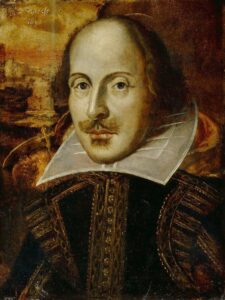Tag: Shakespeare
Wherefore Art Thou, Scorsese?: Humanities Forum Warns of “Absent History”
by The Cowl Editor on March 5, 2020
Campus

by Alexandra Huzyk ’20
News Staff
In this past week’s Humanities Forum, Dr. Brian Walsh spoke on “Shakespeare and the Performance of History.” Walsh, a senior lecturer in the arts and sciences writing program at Boston University, is an expert in adaptations of Shakespeare in film, modern drama, and contemporary drama.
The lecture was meant to compliment the Development of Western Civilization program and was the second of three events to be connected to Shakespeare.
Walsh began the lecture by pointing out that modern consumption of Shakespearean drama is largely by studying plays through print. Even if we do see it, it is often a movie or a recording and not an authentic play.
He stated, “Plays don’t tell us how they were performed, just how they were printed.” By only studying the print itself, one loses both the experience of watching a production and the theatrical context that is meant to enhance the storyline.
Walsh emphasized that Shakespeare’s pieces were live events to which Elizabethan audiences would flock. In order to properly understand these works, we must try to imagine the original condition of these plays and how they were meant to be performed for an audience.
Walsh then began to elaborate on the “heightened awareness of the absence of history,” in the 16th century. At this time, there was a break between the past and the present, and a hankering for history. Shakespeare plays grew out of this culture and aimed to bring about a sort of pleasurable historical consciousness cultivated through the theatre.
In the 16th century, Walsh said, “print history reauthorized oral history,” leaving the question of: where does the oral and visual performance fit into this framework? Walsh said “theatere became an alternative vehicle to experience history.”
Shakespearean dramas are typically looked at through a lens of politics, but Walsh said that they should also be looked at within their historical context, for, “history is written as a means to comment on the present.” Moreso, Walsh stressed the necessity of thinking about how, historically, these plays worked, what their affect might be, and what people felt compelling about them on the visceral level.
Walsh drew examples from Richard III, as it “helps our understanding of the pleasurable self-consciousness of a historical play.” In the theater, history is not only produced through human labor and the use of physical space, but is also perceived by the audience. This theatrical sense of the past impacts the audience so that real, historical figures become inseparable from the theatrical connotation attached to them.
In Shakespearean plays, historical moments developed within one play are alluded to in a separate play entirely. This happens within Henry VI, in which Shakespeare references a number of moments in Richard III. This helps to activate the memories of the audience and combine historical and theatrical memories in order to self-consciously create narratives.
Just as historical and theatrical moments merge, Walsh also pointed out how certain actors have become emblematic of specific Shakespearean roles.
This is evident in the painting titled, “David Garrick as Richard III,” which was painted by William Hogarth. The painting features a recognizable actor playing the part of Richard III. It is contextually ambiguous and “visualizes the historical event, but draws upon Shakespeare’s representation.”
Following the conclusion of the lecture, students and faculty were given the opportunity to ask Walsh questions. One student asked if there is a boundary between history’s narrative and commercialization through false representations.
Walsh says that there is danger in changing the narrative and playing with events for concerns of drama. He posed the questions, “Is changing history in this way just a playful intervention? Is there any danger in that?” He brought up examples of Once Upon a Time in Hollywood and The Irishman—popular movies that twist real life events.
